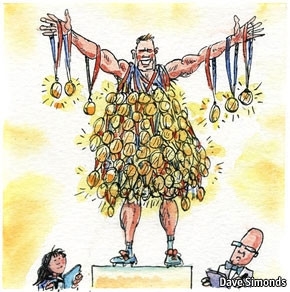
Finance and Economics;Olympionomics;The dismal dash;Which economist will win themedal-prediction gold?
財經;奧運經濟學;令人沮喪的百米沖刺;哪位經濟學家能夠成為“獎牌預測大賽”的冠軍呢?
Athletic prowess is not all that is being tested at this year's Olympic games. There will also be teams of econometricians battling it out to predict how many medals will be won by the host nation.
今年的倫敦奧運會比的已經不僅僅是運動員高超的技藝。還有計量經濟學家們組成的各支代表隊將在“場上”進行激烈地角逐,爭奪“預測東道主英國獎牌數量”大賽的冠軍。
Over the years economists have deployed all sorts of mental gymnastics in their search for a model that can reliably forecast Olympic winners. Initial expectations that medal tallies would be closely correlated with the population and per-capita wealth of a country were soon dashed. The models leapt over the hurdle of statistical significance only when a third variable was added—how many medals the country won last time—but this did not add much by way of explanation.
在過去的幾年里,經濟學家們使出渾身解數,想要找到一種能夠預測奧運會獎牌數量的可靠模型。一開始,他們認為一個國家在奧運會上所獲獎牌的數量可能和這個國家的人口以及人均收入有緊密聯系。但這樣的想法很快就被排除了。而那些可以不需要考慮顯著性差異的預測模型只有當加入第三個變量(即這個國家在上一屆奧運會中獲得了多少獎牌)時才能夠成立。但換句話說,這樣的變量也起不了太大的作用。
Apart from the persistence of good (or bad) performance from one Olympiadto the next, the dismal scientists hopped, skipped and jumped to two otherstatistically significant results. First, there was a“Soviet effect”, whereby the planned economies of the former communist bloc tended to outperform, presumably due to forcing talented youngsters to specialise and pumping them full of steroids . This effect began to fall with the Berlin Wall.
除了考慮到運動員在前后兩屆奧運會中能夠持續發揮良好(或者差勁),這些“神情沮喪”的科學家們煞費苦心地找到了其他兩種具有顯著性差異的結果。首先,有這樣一種“前蘇聯效應”,而且曾經以計劃經濟體制為指導的社會主義陣營國家正是憑借著這樣的一種效應才在奧運賽場上表現得異常出色。有人猜測,這些社會主義國家強迫那些富有才華的年輕運動員們專攻競技比賽,并給他們大量服用類固醇藥物。但是這樣的效應隨著柏林墻的倒塌也開始日漸步入下風。
Second, the host nation tends to win more medals than it does at any other time. Why it does so is unclear, as is the exact size of the “host effect”—which is why, for economists, predicting how many medals Britain will bag is the equivalent of winning the 100-metre dash. Emily Williams, the torchbearer for the Tuck School of Business team that won the medal-forecasting gold last time with 95% accuracy, tips Britain's athletes to win 62 medals (25 of them gold), up from 47 four years earlier in Beijing. That would be a record haul for Britain, and place it fourth overall, behind America (103), China (94,down from 100 when it hosted), and Russia (67).
其次,東道主國家似乎比以往任何時候都能夠贏得更多的獎牌。不過其中的原因并不清楚,這就好比經濟學家們并不知道“主場效應”具體能發揮多大的作用一樣。因此,對他們來說,預測出英國今年能夠包攬獎牌的數量就相當于贏得了這項百米沖刺的冠軍一樣。來自達特茅斯塔克商學院的艾米莉·威廉姆斯(Emily Williams),在北京奧運會召開時,帶領她的團隊以95%的準確率贏得了這塊“獎牌數量預測大賽”的金牌。她指出,這次英國以四年前的47塊為基礎,總共將贏得62枚獎牌(其中包括25枚金牌)。而這樣的數字也將使英國創下紀錄,進入獎牌排行榜第四位,緊隨美國(103枚),中國(94枚,比北京奧運會時的100枚有所下降)和俄羅斯(67枚)其后。
By contrast, PricewaterhouseCoopers thinks Britain will win 54 medals, and Daniel Johnson of Colorado College, another veteran forecaster, actually thinks Britain will win fewer medals at home than it did four years ago in Beijing(down by two to 45). The new comer to the field is Kevin Daly, an economist at Goldman Sachs, who calculates that on average the host nation of an Olympics wins 54% more medals than usual. Taking Britain's 47 last time as “usual”, that would translate into a whopping 72 medals in London. We shall soon find out which, if any, of these dismal scientists is on the right track.
與之相反的是,普華永道的經濟學家們認為英國今年將贏得54塊獎牌;同時,來自科羅拉多學院的老牌預測行家丹尼爾·強生(Daniel Johnson)實際上也認為英國今年將比四年前拿得獎牌少一些(比四年前減少兩枚,即45枚獎牌)。不過,來自高盛(Goldman Sachs)的新手,經濟學家凱文·戴利(Kevin Daly)計算出:一般情況下,奧運會的東道主國家比往常獲得的獎牌數量要多54%。就拿四年前的“47”塊獎牌作為往常量,而經過運算后就得出今年倫敦奧運會英國將獲得驚人的72枚獎牌。當然,不久我們就能知道這些經濟學家中誰預測的結果最準(如果有人預測準確的話)。












